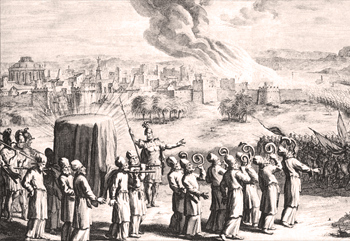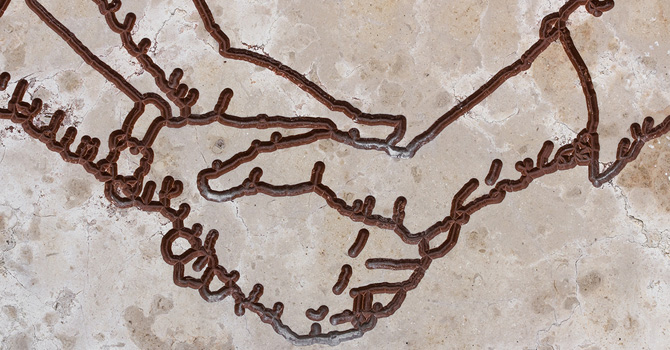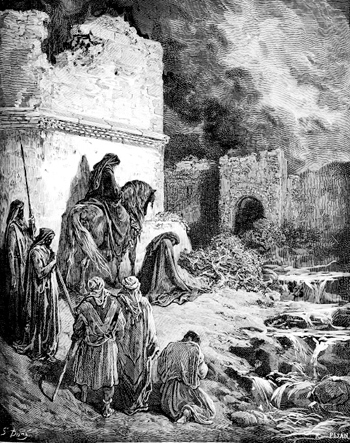Editor’s note: Faith & Leadership offers sermons that shed light on issues of Christian leadership. Ken Evers-Hood preached this sermon July 15, 2012, at Tualatin Presbyterian Church near Portland, Ore.
The most memorable game in Ryne Sandberg’s long career as a second baseman for the Chicago Cubs came in 1984, when the Cubs faced the heavily favored St. Louis Cardinals. In the bottom of the ninth, the Cubs were down 9-8. The Cardinals put in Bruce Sutter, their ace reliever, and after a couple of outs everyone starting pouring out into the streets. But Sandberg stood and delivered. He smacked a fastball over the left-field fence to keep the Cubs alive. People started heading back to their seats. At the top of the 10th, the Cardinals scored two more to again dash the Cubs’ hopes. But would you believe that when Sandberg was back up at bat, with a man on second, he hit another home run to tie the game again? The Cubs went on to win in the 11th, and the event became known as “The Sandberg Game.”
It was an extraordinary moment, but it wasn’t Sandberg’s finest. That came 20 years later, when he was inducted into the Hall of Fame.
“I was in awe every time I walked onto the field. … I was taught you never, ever disrespect your opponent or your teammates or your organization or your manager and never, ever your uniform. Make a great play, act like you’ve done it before; get a big hit, look for the third base coach and get ready to run the bases; hit a home run, put your head down, drop the bat, run around the bases, because the name on the front is a lot more important than the name on the back. That’s respect. … These guys sitting up here [he gestures to those already in the Hall of Fame] did not pave the way for the rest of us so that players could swing for the fences every time up and forget how to move a runner over to third. It’s disrespectful to them, to you, and to the game of baseball. … Respect. A lot of people say this honor today validates my career, but I didn’t work hard for validation. I didn’t play the game right because I saw a reward at the end of the tunnel. I played it right because that’s what you’re supposed to do, play it right and with respect. … If this validates anything, it’s that guys who taught me the game did what they were supposed to do and I did what I was supposed to do.”
Hugh Heclo quotes this speech in “On Thinking Institutionally” to suggest the importance of sensing our place within the world, our debt to the past and our obligation to the future. Sandberg’s words about respect for the game and respect for the people who came before him illustrate that this is a man who was formed and shaped by something much larger than himself. Ryne Sandberg knew he owed his career to those who came before him and that, likewise, he owed a great deal to those who would come next.
This sense of respect for the past and the future is extremely rare today. In every era of great cultural transformation, people invariably become so focused on themselves and the changes they are going through that they lose sight of their past and become blind to where they are headed.
It’s what happened when Israel went through the incredible transformation from having judges to having kings. You see this clearly in the story of the ark.
Anyone who has seen “Raiders of the Lost Ark” has a pretty good sense that the ark of the covenant is a big wooden box you seriously don’t want to mess with. The ark is first described in the book of Exodus when the Israelites would carry it with them through the desert. The box, with two winged cherubim on top, was filled with the two stone tablets inscribed with the Ten Commandments, some manna and Aaron’s rod. Whenever the ark was with them, the Israelites felt like they were invincible.
Except, in the fourth chapter of 1 Samuel, the unthinkable happened. The Israelites went up against the Philistines, who had chariots, and -- even with their ark -- the Israelites were no match. The Philistines captured the ark. Only it started making everyone sick who was near it, so they decided to return it. But even though Israel got the ark back, the people weren’t happy with it anymore. This is the moment when the people ganged up on Samuel and demanded a king so they could be like the nations. Amidst the ensuing changes, the ark was forgotten, a dusty relic in the town of Kiriath-jearim.
Until the first king, Saul, died, and the new king, David, decided to dig deep into the past, retrieve the old relic and try to unite the people around him. But David had lost respect for the tradition and had forgotten how to care for the ark and carry himself around it. Because of this, a young man named Uzzah died.
The story begins with David sending all of his men to Kiriath-jearim. He ordered a new cart to be made for the ark, and this was his first mistake. The ark wasn’t meant to be put on a cart but was supposed to be carried by priests, on poles. With the ark on their backs, the priests could feel the weight of God’s presence with them. The only people who had put the ark on a cart before were the Philistines.
The second mistake the Israelites made was forgetting to offer a sacrifice. They were singing and dancing and making a big racket. David wanted all of the benefits of the ark, but he didn’t want to invest in the work, the time or the money the institution of the ark demanded.
Two young men, Uzzah and Ahio, were assigned to drive the cart bearing the ark. When this circus came to the threshing floor of Nacon, the oxen lost their footing and the ark began to fall. Uzzah, bringing up the rear, reached out and grabbed the ark. He didn’t know not to do this. The anger of the Lord flared up and burst out upon poor Uzzah. He died on the spot.
David’s reaction is so telling. Like a little boy who has had his toy taken away from him, he was angry. But fear quickly took over, and David seems to have realized how reckless he had been. God is God, and we -- even King David -- are not.
Like David, we live in a forgetful, disrespectful time. Watch any professional sport today, and you will watch for a long, long time before you find a quiet leader like Ryne Sandberg who plays out of respect for the team and the game. You will see, however, a parade of egos, each one bigger than the next, dancing and celebrating like David did.
This is true in nearly every facet of our culture. In the business world, we have seen leaders at Enron, Tyco and WorldCom cut corners, betray trust and destroy their companies, dissolving the jobs and in some cases the retirements of thousands of Uzzahs. The world continues to reel from banks giving loans to people without asking for proof of income or assets.
The public sector is no better. Red Cross leadership was forced to admit they didn’t always use the money raised for specific disasters on those disasters. So many other charities spend donations on administration -- and not directly on the people they aim to help -- that former Oregon Attorney General John Kroger created a list of the state’s “worst charities.”
And the church? The impact of clergy sex abuse and the institutional cover-ups have not only cost billions of dollars but have destroyed so many lives.
We are a people who have forgotten that the common good is more important than the personal good. We are a people teetering on the edge of forgetting that everything we have, our blessings, didn’t magically appear. People who came before us sacrificed to create all that we have come to take for granted -- our institutions of higher learning, our civic infrastructure, our economy. They built it for us, not to ravenously consume, but to shepherd, steward, improve and then hand to our children and our children’s children and so on. We are a link in a chain, not the whole.
While we’ve forgotten how to care for the ark, all is not lost. In our lives with God, there is always hope that we can be reshaped, remade and redeemed. After David got over his anger and fear, he tried to recover the ark again, but this time differently.
First, he dug around and found an ephod, a priestly garb, which served as a sign that he was taking this treasure seriously. Next, he gave up the cart. Finally, after those who bore the ark had taken six steps, they stopped and David offered a sacrifice -- not one, but two -- an ox and a fatling. Once David had yoked himself to the institution of the ark, THEN he danced.
There is hope for us, too. Last week, a memorial was planned for Lt. Col. Roy Tisdale, a veteran of Iraq and Afghanistan, at Central Baptist Church in College Station, Texas, home of Texas A&M. As if the tragic loss weren’t bad enough, protester Fred Phelps planned to bring his message of hate to this memorial, as he has done to so many military funerals. Now, this could have been just one more sign of our communal lack of respect, except something else happened. When students got word of the Phelps protest, Twitter and Facebook lit up. Without a single leader or formal organization, students began to show up at the church. Wearing their school colors, they formed a silent wall around this man’s family. They were standing to defend, protect and honor the one who lost his life defending, protecting and honoring the many. Phelps took his hate somewhere else.
What motivated those young people? The temperature that day was over 100 degrees. They could have stayed home, assuming someone else would show up. But they didn’t. They came together and, almost by instinct, they became part of something much larger than themselves.
Beloved, we live at a time when respect for the whole and a sense of how indebted and connected we are to those before and after us is rare indeed. But like David and those young people, it’s what we’re made for. It’s what we’re hungry for. We want to be part of something more important than ourselves. So I ask you: What is that thing for you? What are you living for that’s so much bigger, so much greater than you are? If you’ve forgotten, today it’s time to remember and recommit. If you aren’t sure, but you get a hunch this week -- something a friend says, something you see, a tweet, a Facebook post -- follow it. Follow it. Don’t say, “Someone else will take care of it.” These days, there is no one else. Thanks be to God, in the person of Jesus Christ, we know that even one person doing the right thing can sometimes make all the difference in the world. Amen.














